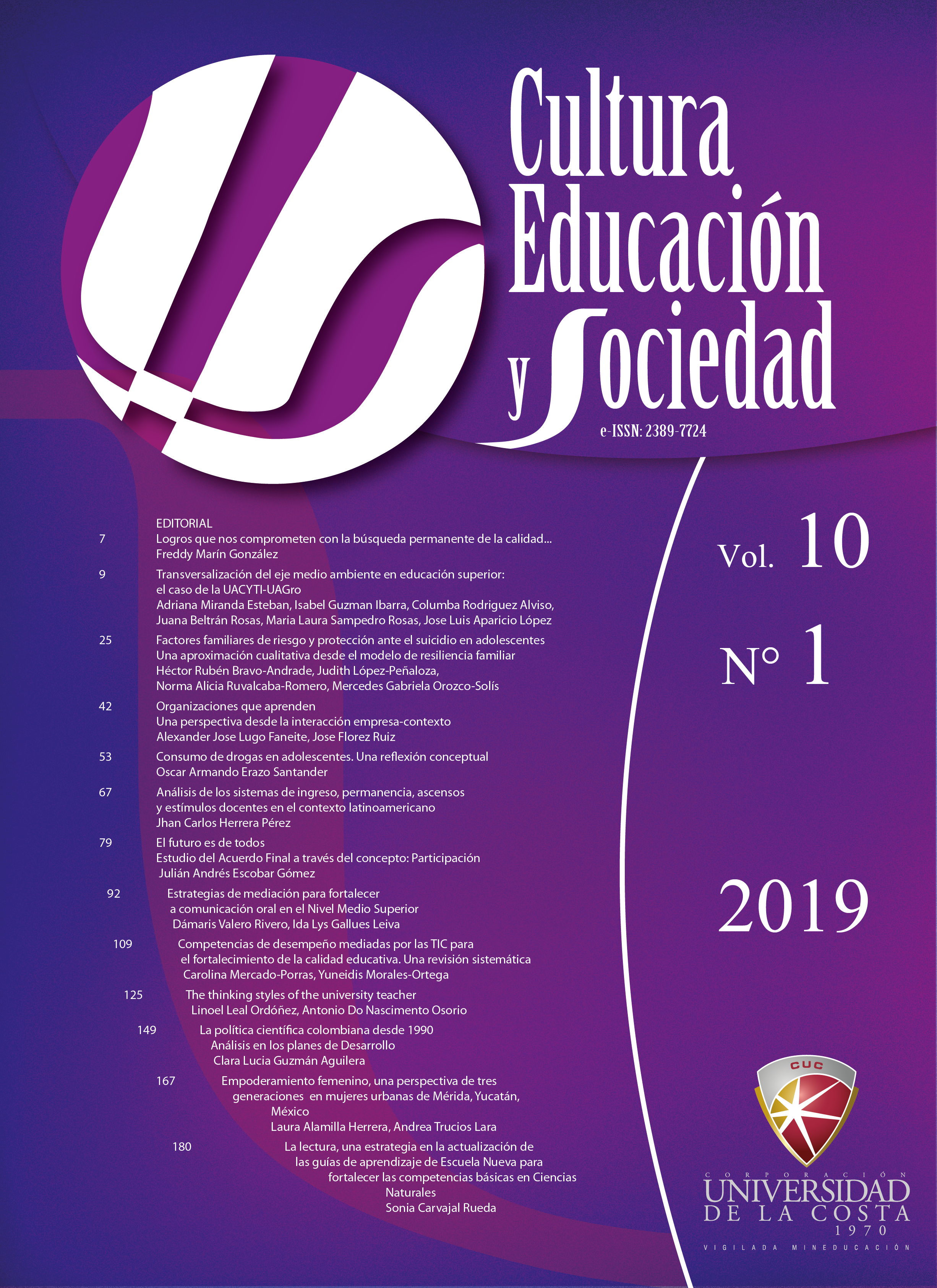Organizations that learn: a perspective from the company-context interaction.
DOI:
https://doi.org/10.17981/cultedusoc.10.1.2019.03Keywords:
Learning organisations, Organisational knowledge, Complexity, Context, UncertaintyAbstract
This article addresses the importance that organizations that learn to learn have in the current context, in a globalized world with constant changes that requires the process of knowledge acquisition, managerial transformation, to be at the forefront, achieve success and be a highly competitive organization, in the business reality of the 21st century. A theoretical analysis was carried out under a bibliographic design that allowed defining, describing and explaining, through deductive inference, organizations that learn to learn, the prevailing thinking of subjects and teams that learn in systemic organizations, change, complex contexts and the management of uncertainty as resources that potentiate learning, the construction of organizational knowledge and finally the approximate ways to learn and build knowledge. The final reflections as a conclusion reflect that the continuous creation of organizational knowledge is the key to ensure the evolution of the organization and ensures that the organization changes, transcends and evolves.
Downloads
References
Ausubel, D. (1981). Psicología Educativa, México, D.F.: Trillas.
Bateson, G. (1991). Pasos hacia una ecología de la mente. Una aproximación Revolucionaria a la auto comprensión del hombre. Buenos Aires Lohlé-Lumén.
Bolívar, A. (2000). El liderazgo compartido según Peter Senge. En, A. Villa (Ed.), Liderazgo y organizaciones que aprenden. III Congreso Internacional sobre Dirección de Centros Educativos. (459–471). ICE de la Universidad de Deusto, Bilbao.
Castro, B. (2007). Análisis organizacional desde la teoría general. [Tesis doctoral]. Universidad de La Serena, Chile.
David, A. (2000). Logique, épistémologie et méthodologie en sciences de gestion. In A. David, A. Hatchuel & R. Laufer, (Eds.), Les nouvelles fondations en sciences de gestion (83-109). Paris: Librairie Vuibert.
Etkin, J. (2009). Gestión de la complejidad en las organizaciones. Buenos Aires: Granica
Fayol, H. (1981). Administración Industrial y General. Buenos Aires: El Ateneo.
Garbanzo-Vargas, G. (2016). Desarrollo organizacional y los procesos de cambio en las instituciones educativas, un reto de la gestión de la educación. Revista Educación, 40(1), 67–87. http://dx.doi.org/10.15517/revedu.v40i1.22534
Garzón M. y Fisher A. (2008). Modelo teórico de aprendizaje organizacional. Revista científica Pensamiento y Gestión, 24(1). [Online]. Recuperado de http://rcientificas.uninorte.edu.co/index.php/pensamiento/article/view/3507/4926
Guzmán, I. (2013). La ciencia de la administración: la dirección de los grupos humanos. México, D. F: Limusa.
Hargreaves, A. (1998). Profesorado, cultura y postmodernidad. Madrid: Morata.
Hernández, R., Fernández C., Baptista M. (2014). Metodología de la Investigación. 6 ed. México D.F.: Mcgraw-Hill/ Interamericana Editores.
Ibáñez, N. & Castillo, R. (2012). Resignificado del aprendizaje del idioma inglés bajo el influjo de las tecnologías de la información y comunicación. Caso: Universidad de Carabobo. Orbis. Revista Científica Ciencias Humanas, 8(22), 49–63.
Marín, F. (2012). Investigación científica: Una visión integrada e interdisciplinaria. Mérida: Universidad del Zulia.
Narváez, M., Gutiérrez, C. y Senior, A. (2011). Gestión organizacional. Una aproximación a su estudio desde el paradigma de la complejidad. Revista Venezolana de Análisis de Coyuntura, 13(2). 27–48. Recuperado de http://saber.ucv.ve/ojs/index.php/rev_ac/article/view/3234
Pardo, C. y Díaz, O. (2014). Desarrollo del talento humano como factor clave para el desarrollo organizacional, una visión desde los líderes de gestión humana en empresas de Bogotá D.C. Suma de Negocios 5(11). 39–48. https://doi.org/10.1016/S2215-910X(14)70018-7
Padrón-Guillen, J. (2013). Epistemología Evolucionista: una Visión Integral. [Documento Conferencia]. Entre Temas, Caracas, Venezuela. http://dx.doi.org/10.13140/2.1.1900.3527
Pinto, M. y Misas, M. (2014). La educación inicial y la educación preescolar: perspectivas de desarrollo en Colombia y su importancia en la configuración del mundo de los niños. Cultura Educación y Sociedad, 5(2). 119–140. Recuperado de https://revistascientificas.cuc.edu.co/culturaeducacionysociedad/article/view/889
Reyes, A. (2000). Administración de personal. Relaciones Humanas. México, D.F.: Limusa.
Senior, A., Narváez, M., Fernández, G. y Revilla, J. (2007). Responsabilidad ambiental: factor creador de valor agregado en las organizaciones. Revista de Ciencias Sociales (Ve), 13(3), 484–494.
Senior, A., Narváez, M. y Fernández, G. (2008). Las capacidades éticas y ambientales como agentes movilizadores del capital social: Un desafío para el desarrollo sostenible. Espacio Abierto, 17(4), 697–713.
Smith, H., Lovera, M. y Marín, F. (2008). Innovación tecnológica en la organización empresarial: un análisis desde la teoría biológica evolucionista. Multiciencias, 8 (1), 28–37.
Published
How to Cite
Issue
Section
License
Copyright (c) 2019 CULTURA EDUCACIÓN Y SOCIEDAD

This work is licensed under a Creative Commons Attribution-NonCommercial-NoDerivatives 4.0 International License.
![]()
Creative Commons 2020 CULTURA EDUCACIÓN Y SOCIEDAD
This article is under international license Creative Commons Reconocimiento-NoComercial-SinObrasDerivadas 4.0.
The published articles are the sole responsibility of their authors and do not necessarily reflect the opinions of the editorial committee.
CULTURA EDUCACIÓN Y SOCIEDAD respects the moral rights of its authors, who assign to the editorial committee the patrimonial rights of the published material. In turn, the authors inform that this work is unpublished and has not been previously published.
All articles are under a:
Licencia Creative Commons Atribución-NoComercial-SinDerivadas 4.0 Internacional.
![]()


 English
English
 Español (España)
Español (España)




_12.53_.27_p_. m_._3.png)





_12.57_.35_p_. m_._3.png)
_12.50_.37_p_. m_._3.png)



